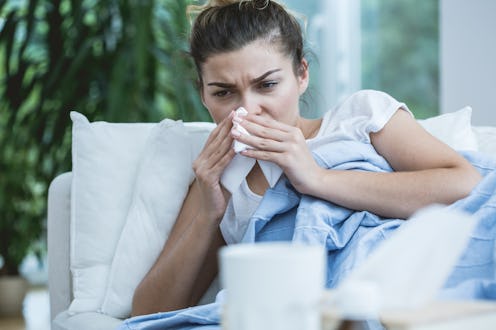Life
The Exact Flu Medicine You Should Take, Based On Your Symptoms
When you're laid up with the flu, surrounded by a nest of sweaty blankets and four hours deep into a day of Friends reruns, two questions become all-consuming. First, what type of medicine do you take when you have the flu? Second, how do you get your germy hands on it as soon as possible? Unfortunately, while humans have invented marvels such as microwave burritos and airplanes, nobody has managed to invent a medicine that magically cures the flu. (Scientists have created anti-viral drugs, but more on that later.) For most otherwise-healthy adults, the flu goes away on its own, but that doesn't mean you have to wait it out in misery.
Dr. Jennifer Caudle, family physician and associate professor at Rowan University School of Osteopathic Medicine, tells Bustle over the phone that help can be found right down the street. "I think the best thing for people to do is head to the pharmacy," she says, suggesting that patients choose an over-the-counter medicine based on their specific symptoms. "Lots of medications are very clear what they treat and what they don’t."
This is partly because some medicines contain more than one drug. Mucinex DM, for example, contains both guaifenesin, an expectorant, and dextromethorphan HBr, a cough suppressant. To make sure you aren't taking more medicines than you need, be sure to check the ingredients listed on the label. "You want to know what you’re taking, so you don’t take extra [medicine]. That’s something I feel very strongly about," says Dr. Caudle.
If you have other medical conditions that may interfere with different medication, this might seem like a tall order when you're already struggling with a high fever. In that situation, check in with the pharmacist on duty, especially if you're worrying about current medications interfering with the medicines you picked up for the flu.
For the high fever, chills, and body aches often associated with the flu, the same stuff that you take for headaches can reduce the severity of your symptoms. "You have to know your body, you have to know your medical conditions and make sure your doctor okays it, [but] I would say a really great start for a lot of these things is either ibuprofen or acetaminophen," says Dr. Caudle.
The Centers for Disease Control (CDC) actually suggests that aside from trips made for medical care, most healthy adults can stay home and let the flu play itself out, but if you're concerned or a high risk patient, check with your doctor. They may prescribe an antiviral medication like zanamivir, peramivir, or oseltamivir.
According to the CDC, these medicines can't stop you from catching the flu, but they can shorten the duration of symptoms by about one day. The key is to catch it early; the organization recommends starting antivirals within two days of getting sick.
While many adults can treat their flu symptoms with over the counter medicines, it's always a good idea to contact your doctor if you're worried. "We don’t necessarily recommend everyone comes into the office, because some people may not need to and they may expose other people," Dr. Caudle explains. "But if you’re concerned about the symptoms or if your symptoms become very very severe, you should absolutely touch base with your doctor."
Aside from medicines, the quickest road to recovery involves letting your body rest. The CDC recommends staying home from everything except medical visits for at least 24 hours after your fever goes away to avoid infecting others. During that time, you're free to be a couch potato: The Mayo Clinic recommends treating the flu with bed rest and drinking plenty of fluids to stay hydrated, especially if you have a fever. Also, don't forget to wash your hands often and cover your coughs to avoid spreading the disease.
Finally, if you've avoided the flu so far, the flu shot is still an option. "People think it’s too late, but it’s not," explains Dr. Caudle. "That’s probably one of the best ways not only to protect ourselves, but to protect other people."
